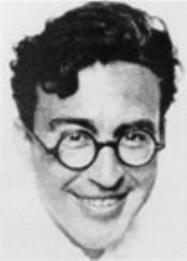Emilio Prados facts for kids
Emilio Prados (born March 4, 1899, died April 24, 1962) was an important Spanish poet and editor. He was part of a famous group of writers called the Generation of '27.
Contents
Emilio Prados's Early Life and Studies
Emilio Prados was born in Málaga, a city in Andalusia, Spain, in 1899. In 1914, he got a special invitation to study at the famous Residencia de estudiantes in Madrid. This was a special student residence where many bright young people lived and learned.
By 1918, he moved into the university part of the residence. There, he met many people who would become very famous. These included the poet Lorca, the artist Dalí, and the filmmaker Buñuel. They all became important figures in Spanish art and literature.
Travels and Becoming a Writer
In 1921, Emilio had to go to a sanatorium in Davosplatz, Switzerland, because of a long-term lung illness. He spent most of the year there, away from everyone. During this time, he read many books from different European countries. This quiet time helped him decide that he wanted to become a writer.
After leaving the sanatorium in 1922, he continued his studies. He took classes at universities in Freiburg and Berlin in Germany. He also visited many museums and art galleries across Germany. He then went to Paris and explored the art scene there, even meeting the famous painter Pablo Picasso.
Returning to Spain and Literary Work
In the summer of 1924, Emilio Prados returned to Málaga and kept writing. He worked with another writer named Manuel Altolaguirre. Together, they started a magazine called Litoral. This magazine became one of the most important places for new literature and art in Spain during the 1920s.
In 1925, he became an editor for the Sur printing-house, again working closely with Altolaguirre. The Sur printing-house was very important because it published most of the books by the Generation of '27. Their excellent editing work made Prados and Altolaguirre well-known around the world.
Involvement in the Spanish Civil War
While working on literature, Emilio Prados also became very interested in social issues and politics. He cared deeply about the poorest people in society who were often left out.
When the Spanish Civil War started in 1936, there was a lot of fighting in Málaga. This made him move back to Madrid. There, he joined a group called the Alianza de Intelectuales Antifascistas. This group was made up of thinkers who supported the Republican side against the Nationalists in the war. Emilio enthusiastically helped with the intellectual efforts for the Republican cause.
He published his own books during this time. His collection of war poems, Destino fiel, won the National Literature Prize in 1938. He also edited other important books, like Homenaje al poeta Federico García Lorca and Romancero general de la guerra de España.
Exile to Mexico
In 1938, Emilio Prados moved to Barcelona. There, he and Altolaguirre were put in charge of publications for the Republican Ministry of Public Instruction. However, the Nationalists won the Civil War, and as a strong supporter of the Republicans, he had to leave Spain.
He first escaped to Paris. Then, in early July 1939, he traveled to Mexico with many other Republican thinkers. He lived in Mexico until he passed away in 1962.
Emilio Prados's Literary Works
Emilio Prados's poetry changed over time, reflecting his experiences and thoughts.
Early Work (1925 - 1928)
In his early poems, Prados often wrote about the connection between nature and the feeling of being different or unique. He mixed new artistic styles like avant-garde and surrealist ideas with his own Spanish and Arabic roots.
- Tiempo
- Veinte poemas en verso
- Seis estampas paraun rompecabezas
- Canciones del farero
- Vuelta
- El misterio del agua
Political Poetry (1932 - 1938)
During this period, Prados wrote a lot of poetry that openly talked about social and political issues. He used surrealist language to explore these important themes.
- La voz cautiva
- Andando, andando por el mundo
- La tierra que no alienta
- Seis estancias
- Llanto en la sangre
- El llanto subterráneo
- Tres cantos
- Homenaje al poeta Federico García Lorca contra su muerte
- Romances
- Romancero general de la guerra de España
- Cancionero menor para los combatientes
- Destino fiel (This collection of his war poetry won the Premio Nacional de Literatura in 1938.)
Poetry from Exile (1939 - 1962)
After being forced to leave Spain, Prados's later poetry showed a deep feeling of not belonging anywhere and being alone. His writing became more complex and philosophical. He explored ideas like new beginnings, helping others, and love.
- Mínima muerte
- Jardín cerrado
- Memoria del olvido
- Penumbras
- Río natural
- Circuncisión del sueño
- Signos del ser
See also
 In Spanish: Emilio Prados para niños
In Spanish: Emilio Prados para niños


